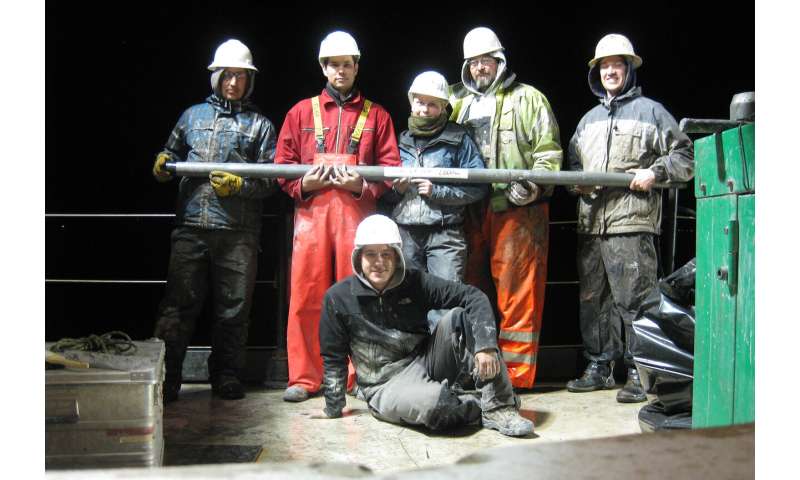
By analysing sediment cores from the bed of Europe's oldest lake, an international team of scientists has created a detailed climate history of the north-central Mediterranean stretching back 1.36 million years—and revealed the climate mechanism that has driven winter rainfall in the region.
The scientists, including Dr. Alexander Francke from the University of Wollongong (UOW), drilled into the bed of Lake Ohrid, which lies on the border of Albania and North Macedonia and is thought to be the oldest lake in Europe. The study was led by Associate Professor Bernd Wagner from the University of Cologne and Dr. Hendrik Vogel from the University of Bern.
The results of their research are published in the prestigious scientific journal Nature.
By providing an unprecedented understanding of the factors that have driven the Mediterranean region's climate in the past, the data they collected will help scientists to model more accurately the region's future climate under global warming.
The drilling took place in water 245 metres deep and reached a maximum depth of 568 metres into the sediment. Analysis revealed that Lake Ohrid first established 1.36 million years ago and has existed continuously since then. The extensive sediment succession allowed the researchers to reconstruct climate over the entire history of the lake in exquisite detail.
Geochemical data and the pollen record show that winter rainfall increased in the north-central Mediterranean region during warm, interglacial periods. During these intervals, climate model simulations indicate increased cyclogenesis (the development and strengthening of low-pressure areas in the atmosphere) over the Mediterranean Sea during summer and late autumn leading to considerably higher winter rainfall.
The Mediterranean climate is characterised by dry summers and wet winters, so winter rainfall is vital for the region's population and agriculture.

"We discovered a teleconnection between the African monsoon and winter precipitation in the Mediterranean region, so between tropical climate systems and rainfall in the mid-latitudes thousands of kilometres away," said Dr. Francke, a Research Fellow at the Wollongong Isotope Geochronology Laboratory.
"Whenever incoming solar radiation from the sun is enhanced in the northern hemisphere you have this northward migration of the tropical climate system and we see increased rainfall in winter at Lake Ohrid. We see this mechanism consistently over the past 1.3 million years."
During these warmer periods, the northward move of tropical climate systems caused higher sea surface temperatures in the Mediterranean and increased evaporation, amplifying local cyclone development in the Mediterranean and strengthening of North Atlantic low-pressure systems migrating eastwards.
"This climate system would be fairly stable during the summer and autumn until the temperatures decrease in winter and cold air from the north causes the whole system to become unstable and this low pressure system moves eastwards towards the Balkan Peninsula and promotes rainfall in the winter months," Dr. Franke explained.
There is currently a discrepancy in climate models about how global warming will affect the Mediterranean climate and, in particular, how it will affect winter rainfall: some models show increased winter precipitation, others show it becoming drier.
Dr. Francke says the data gathered from Lake Ohrid will enable a better understanding of how climate change will affect the region. However, because recent human-driven climate change has different causes than previous warmings, it is not yet certain whether it will lead to a similar increase in winter rainfall in the Mediterranean.
"We have to be careful. We can't just take these results and say that if it gets warmer in the future there will also be more rainfall during winter in the Mediterranean," Dr. Francke said.
"Some climate models are predicting more winter rainfall but others are predicting drier winters. However, climate modellers will now be able to use the data we gathered from Lake Ohrid to improve their models and develop more accurate predictions of what will happen in the future."
Citation: Europe's oldest lake traces 1.36 million years of climate (2019, September 3) retrieved 3 September 2019 from https://phys.org/news/2019-09-europe-oldest-lake-million-years.html
This document is subject to copyright. Apart from any fair dealing for the purpose of private study or research, no part may be reproduced without the written permission. The content is provided for information purposes only.
https://phys.org/news/2019-09-europe-oldest-lake-million-years.html
2019-09-03 07:53:23Z
CAIiEI0fZiOl3mVoE3gTep6NcBIqFwgEKg8IACoHCAowpbDpAzCm_hwwj9kp
Bagikan Berita Ini














0 Response to "Europe's oldest lake traces 1.36 million years of climate - Phys.org"
Post a Comment